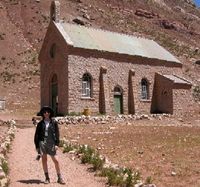The more things change...
Tonight we watched Dr. Zhivago, the old one with Omar Sharif and Julie Christie. I read the book years ago, during my Summer of Russian Literature, but the movie struck me for its compelling portrayal of the hardness of life in a disintegrating society. Perhaps not a realistic portrayal - I wouldn't know - but striking nonetheless.
I think sometimes about what would happen if this society just fell apart for some reason - economic collapse, war, a massive electromagnetic pulse that disables all electronic devices...pick your apocalypse. I envision us wandering the desolate countryside after the apocalypse with our dogs on ropes, and I joke about this frequently enough that my friend Megan once said, "Why are your dogs always on ropes in this scenario? Are there no leashes after the apocalypse? Will there be some kind of doomsday leash-vaporizing machine?"
A couple of weeks ago in Phoenix, I had a cab driver who came to the US from Somalia at 17, during the war. I commented that Seattle, my home, has a large east African community and he nodded and held up his cell phone - he had just been talking to someone in Seattle, in fact. Many Somalis move to Seattle, he said, because it is like home, with its mountains close to the sea.
I got to asking him more questions about what Somalia is like, and he explained that most of the country is peaceful, but there is no central government, just local governing authorities that are tribally based. "Do people want a central government again," I asked, "or do they prefer localized government?"
"Oh no, people are ready for a government again. The whole tribe thing...When I was growing up, my parents never told me what tribe we were from, even though it was one of the big ones historically, a powerful one. That wasn't important any more. It was only after the war started, suddenly people reverted to 200 years ago - who was from what tribe, which one used to control this area or that. After all these years, people started teaching their children, 'you're from this tribe, they're from that tribe,' and the children learn that." He shook his head. "The bullshit that people teach their children, it sticks, you know?"
"Yeah well. I think most cultures have their bullshit that they teach their children. We certainly do in this country."
"Oh, yes," he said. He held up his arm and pointed to it. "Like about skin color."
Indeed, about skin color. We rode in silence for a while. "When we came to this country," he said tentatively, "I had no other home to go back to. And I am very grateful. This is a good life here. But people here...they don't understand what a good life they have. They don't understand what it's like elsewhere, what happens when the life you know just - disappears."
I asked how easy it is to go back and visit now. It's possible, he said. His mother in fact just went back to visit her elderly mother, because she couldn't stand to be away any more. "Eventually," he said with a shrug, "people get tired of killing each other."
Well, let's hope he's right about that.

No comments:
Post a Comment